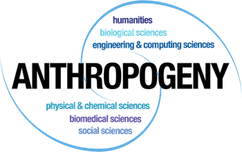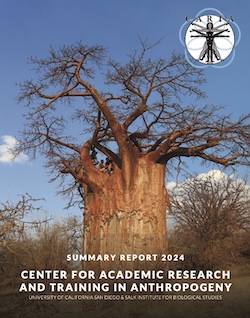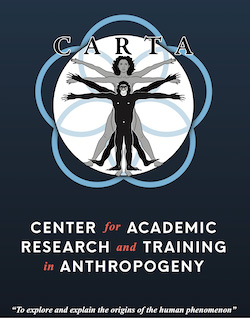About CARTA
The Center for Academic Research and Training in Anthropogeny* (CARTA) is a virtual organization formed in order to promote transdisciplinary research into human origins, drawing on methods from a number of traditional disciplines spanning the social, biomedical, biological, computational and engineering, physical and chemical sciences, and the humanities. CARTA began as a collaboration between faculty at UC San Diego and at the Salk Institute for Biological Studies, along with interested scientists at other institutions. In January 2008, CARTA became a UC San Diego recognized Organized Research Unit (ORU).
*Anthropogeny: The investigation of the origin of man (humans) Oxford English Dictionary, 2006. First used in 1839 edition of Hooper's Med. Dict. and defined as "the study of the generation of man".
Our Philosophy
Questions about origins rank among our greatest unsolved mysteries – the origin of the universe, the origin of life, the origin of the living cell, and the origin of humans. It is the origin of humans, or anthropogeny, that CARTA has singled out to explore and understand...
- Where did we come from?
- How did we get here?
CARTA was founded on the conviction that answers are likely to come not from a single line of investigation, but from a wide variety of approaches within the biological, biomedical, and social sciences, as well as aspects of the arts and humanities, with important technological input from the physical, chemical, and computing sciences.
There is also a practical side to anthropogeny as the study of human origins has a major impact on, and relevance to, issues related to medicine, biology, the organization of society, the upbringing of our young, and the interactions of humans with one another and with our environment.
While interest in our origins is far from new, we humans now have the ability to approach anthropogeny in a systematic and multidisciplinary manner. We can and must integrate the vast amount of relevant information coming in from so many different fields, such as comparative genomics, to expand our understanding of language, behavior, and culture. CARTA brings together scholars with expertise spanning all of the relevant fields, and facilitates the speed of progress through transdisciplinary collaborations, as opposed to the old model of interdisciplinary collaborations between two disciplines.
Such group efforts can also generate novel, testable hypotheses and agendas for fruitful research while training a new generation of young minds dedicated to the pursuit of the problem and its many practical and philosophical implications.
The Origins of CARTA

Researchers in diverse fields related to anthropogeny began meeting in the La Jolla area in the late 1990s, an effort coordinated by the UC San Diego Project for Explaining the Origin of Humans (POH). The group consisted of experts in San Diego and many others from around the world. The primary activity of the group was to organize transdisciplinary meetings in La Jolla, and to facilitate interactions via the internet.
As many intellectual and practical opportunities surfaced, the original Project was re-established in January 2008 as a formal Organized Research Unit (ORU) at UC San Diego and in close collaboration with interested faculty at the Salk Institute for Biological Studies. Thus, the Center for Academic Research and Training in Anthropogeny, or CARTA, was founded.
CARTA is a larger and more publicly active research program than POH, and one that facilitates graduate and postgraduate education in relevant departments and programs to equip the next generation of scholars who will formulate and address questions concerning the origins of humanity.
To learn more about the origins of CARTA, download our Informational Banner or read It So Happened: James Harvey Handelman and the Origins of CARTA.
Areas of Interest

The goals of CARTA are essentially scholarly, with attention to minimizing the usual obstacles of academia (e.g. organizational structures, hierarchies, paperwork and bureaucracy). The major interests of the group are:
- Identifying and explaining structural and molecular differences between humans and members of the genetically related hominid family of “great apes.”
- Defining and explaining the evolutionary origins of humans (e.g., understanding the events of the last 15 million years of great ape and human evolution).
- Identifying human functional specializations relative to other hominids and explaining genetic and biological mechanisms involved in generating these specializations.
- Identifying and explaining the external mechanisms (environmental, cultural, etc.) affecting the selection and expression of these human functional specializations.
- Based on all of the above, generating testable hypotheses and new research agendas.
Thus, the broad topic areas of interest are:
- Human and Primate Genetics and Evolution
- Paleoanthropology and Hominid Origins
- Mammalian and Primate Neurosciences
- Primate Biology and Medicine
- Language, Communication and Cognition
- Nature-Nurture Interactions in Explaining Language and Cognition
- Human and Primate Society and Culture
- Comparative Developmental Biology of Primates
- General Theories for Explaining Humans
- Based on all of the above, generating testable hypotheses and new research agendas.
Interested in learning more about CARTA? We invite you to read the CARTA Summary Report or download the CARTA brochure for an overview of CARTA's mission and educational programs.



